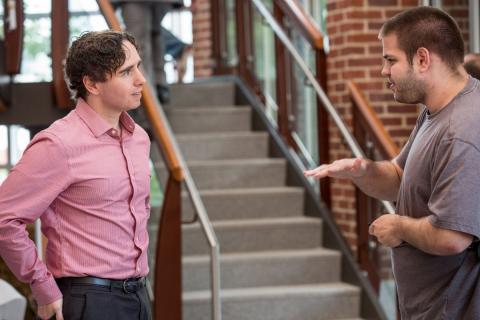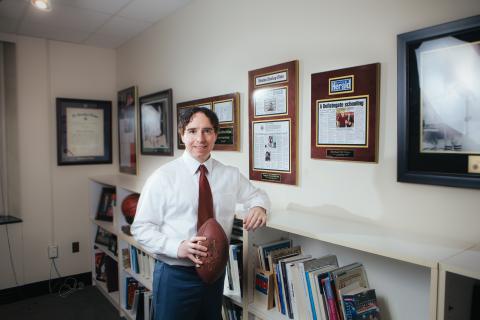Writing His Way In
Professor Michael McCann used his skill with words to break into the field of sports law.

On January 18, 2015, all eyes in the football world were on the AFC Championship game. But it was not the New England Patriots’ convincing 45-7 victory over the Indianapolis Colts that would become the story of the matchup to decide who would move on to face the Seattle Seahawks in Super Bowl XLIX. What endured beyond gameday was the science behind the pounds per square inch (psi) of inflation inside a dozen footballs.
The narrative of whether legendary New England quarterback Tom Brady had knowledge of the intentional underinflation of game balls, and whether a locker room attendant had helped him conspire in the plot, was covered deftly by journalist and legal expert Michael McCann, a contributing writer for Sports Illustrated, professor at UNH Franklin Pierce, and director of the laws school’s Sports & Entertainment Law Institute.
“It was a huge story because it was one I could cover locally that had a national reach,” McCann told A.J. Kierstead on “Profiles,” a special series of the law school’s podcast, The Legal Impact. “It was also interesting on at least three levels. One was the science of it. Is it true what the NFL claims about the Patriots and Tom Brady? As I discovered, there were scientists who said it just doesn’t make any sense what the NFL was saying. So there was the idea that how could the NFL put forward a theory of conduct that the basic rules of science say couldn’t have happened? And why would that not end the story? It doesn’t end the story because, in law, that’s not how the story ends.”
The issues aroused by Deflategate and the ensuing legal proceedings have evolved into a series of teachable moments for McCann in his work at UNH, where he developed an undergraduate course named after the controversial incident. In addition to Deflategate, the course also covered antitrust law, labor law, intellectual property law, torts, and contracts.
“It was a good survey course under the masking of Deflategate,” says McCann, recalling that the first class was filmed by three Boston-based TV stations. “It was really a law course at the end of the day. I think, for some at least, it gave them interest in law.”
Pursuing a career in law was not a stretch for McCann, a Massachusetts native, who graduated from St. John’s Prep and Georgetown University, before taking a job with then-Middlesex County (Mass.) District Attorney Tom Reilly. His work with the D.A. inspired McCann to follow his two older sisters into the legal profession and attend law school at the University of Virginia, where he served as editor-in-chief of the Sports and Entertainment Law Journal. He entered private practice in Boston and learned a couple of years into his work of the case of Ohio State football player Maurice Clarett, who sued the NFL in 2003 over its age eligibility rule. McCann’s brother reminded him that he had written at UVA about the regulation and suggested he send the article to Clarett’s lawyer, Alan Milstein (now an adjunct professor at UNH Franklin Pierce).
“I said, ‘Why would he even look at it? I’m just some random whatever,’” McCann recalls, though he took his brother’s advice and was pleasantly surprised to receive a reply. “[Milstein] emailed me back and said he read it and he found it very interesting. He invited me to join the legal team for Clarett, and that was my first experience in sports law.”
As a professor, McCann tells his students that he was able to break into sports law because of his writing. That article for UVA about the NBA draft and age eligibility stemmed from something simple – McCann’s lifelong identity as an avid fan of the Boston Celtics.
“Use your time in law school wisely and think about writing projects,” advises McCann. “They may not get you on a famous case, but they might, and that might be your only way onto a case like that.”

After that first experience, McCann went on to earn an LL.M. from Harvard, where he studied under several influential professors, including Paul Weiler, without whom, McCann asserts, “I don’t know if sports law is a standalone discipline.”
His foray into sports journalism was another pleasant surprise for McCann, who received a job offer from Sports Illustrated editor B.J. Schechter after McCann impressed in an interview for the magazine about derogatory comments made by broadcaster Don Imus about female basketball players at Rutgers University. He joined to SI staff to cover issues of sports law, writing about the Boston Marathon bombings, the murder trials of former NFL star Aaron Hernandez, the NBA’s ouster of former L.A. Clippers owner Donald Sterling, equal pay litigation for the U.S. Women’s National Team, and former NFL quarterback Colin Kaepernick’s collusion grievance.
McCann’s work for SI also included writing about the case of former UCLA and NBA star Ed O’Bannon, who successfully sued the NCAA in an antitrust class action lawsuit on behalf of Division I basketball and football players. The suit asserted that players should be entitled to financial compensation for the organization’s commercial use of their images. O’Bannon also settled a portion of the class action suit with gaming company Electronic Arts over its unauthorized use of player images in its 2009 version of the “NCAA Basketball” video game. The relationship McCann formed with O’Bannon led to the pair co-authoring the 2018 memoir Court Justice: The Inside Story of My Battle Against the NCAA. McCann invited O’Bannon to UNH Franklin Pierce give his first public comments after the NCAA suit was resolved, an invitation he accepted.
“It was a great experience to write with someone who is so thoughtful, so caring, so selfless,” says McCann. “To give up years of your life for a case that is about changing rules that are going to benefit others really speaks volumes about the person.”
After 13 years with Sports Illustrated, McCann was recently asked to join the digital content team as a senior writer and legal analyst at Sportico, an online platform for sports news powered by Rolling Stone and Variety publisher Penske Media. In between, he has found a love of teaching. Prior to arriving at UNH Franklin Pierce, McCann served on the faculties of Vermont Law School and Mississippi College School of Law, and was a visiting professor at Boston College Law School. At UNH, he teaches courses in sports law, sports betting law, and name, image, and likeness in sports, among others.
While McCann is one of the lucky ones to have broken into the sports law industry, he reminds his students that few young lawyers will find work within professional sports organizations right out of the gate. He advises them to instead pursue legal counsel positions within college athletic departments, which often need guidance as they navigate the many rules associated with NCAA athletics.
“If you want to be a lawyer for the Lakers or Dolphins or Red Sox, it’s not going to happen right out of law school,” he says. “The immediate future is that a lot of colleges are going to need lawyers in their athletic departments because there are major changes coming to college athletes’ relationships with schools. They [may] be able to get compensated for their name, image, and likeness, and a lot of schools aren’t ready for that. For law students looking to get into sports law right out of school, the college approach is definitely the way to go.”
---
Listen to Professor Michael McCann on the Profiles series of The Legal Impact podcast